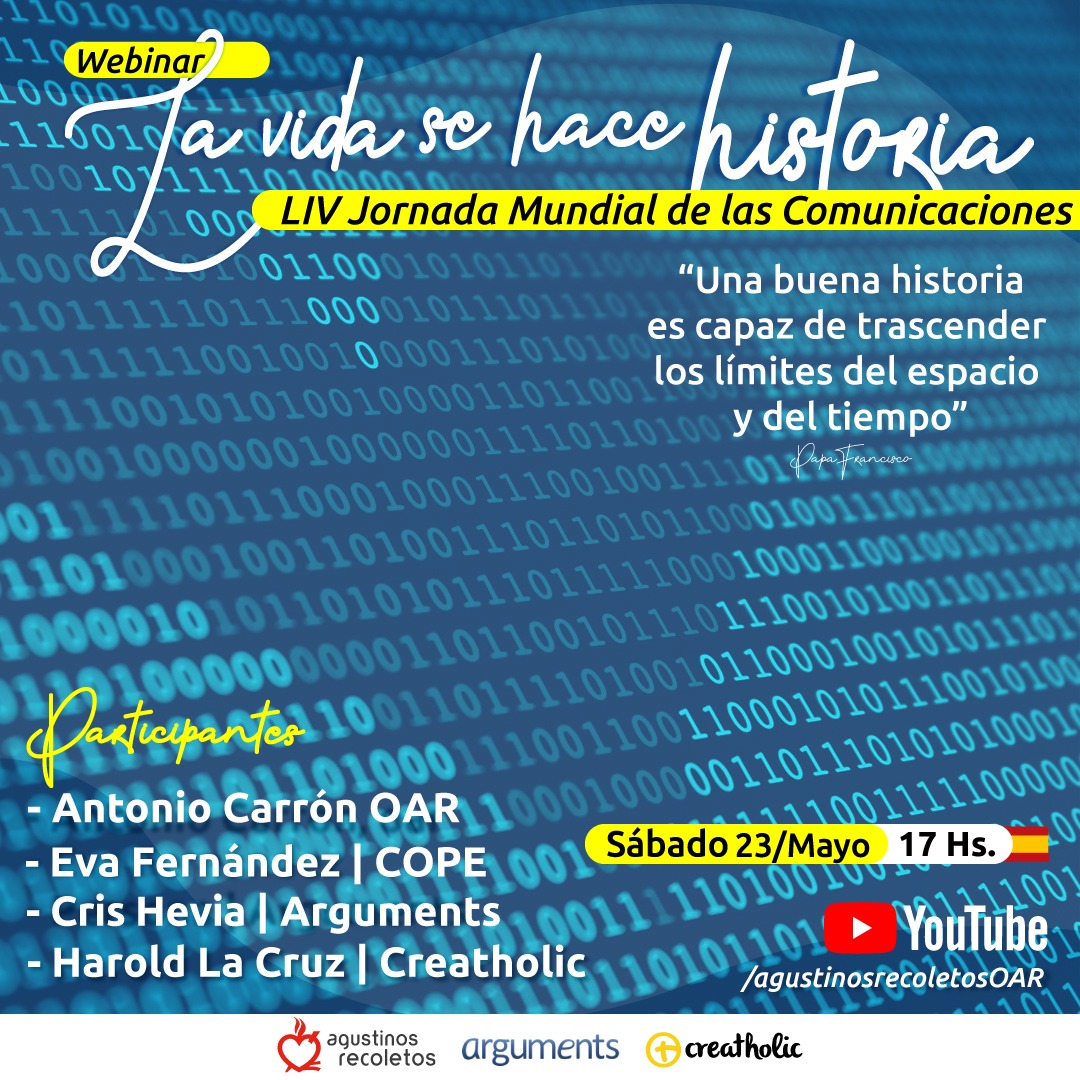
Did you know that Sunday, May 24, is the World Communications Day? To celebrate it, the day before we collaborated in a ">https://www.youtube.com/watch?v=nZAcw-JOqsI">webinar very special, where we talk about what we love the most: stories. But not just any story, but as the Pope says in his message for this year's day: "We are not just talking about any story, we are talking about stories.good stories"; "those capable of transcending the limits of time and space". Compartimos experiencias junto a nuestra querida Eva Fernandez, COPE correspondent at the Vatican; Harold La Cruz, of Creatholic y Antonio Carrón, OAR. From Arguments participated our Communications Director, Cris Hevia. We talked about communication in the Church, stories in communication and stories in the coronavirus crisis. At the end there was a time for questions that were asked through the chat of YouTube channel of the Order of Augustinian Recollects desde el que se emitió.
I want to dedicate the Message This year's theme is storytelling, because I believe that in order not to get lost, we need to breathe the truth of good stories: stories that build, not destroy; stories that help us find our roots and the strength to move forward together. In the midst of the confusion of voices and messages that surround us, we need a human narrative that tells us about ourselves and the beauty we possess. A narrative that knows how to look at the world and events with tenderness; that tells us that we are part of a living fabric; that reveals the interweaving of the threads with which we are united to one another.

El hombre es un ser narrador. Desde la infancia tenemos hambre de historias como tenemos hambre de alimentos. Ya sean en forma de cuentos, de novelas, de películas, de canciones, de noticias…, las historias influyen en nuestra vida, aunque no seamos conscientes de ello. A menudo decidimos lo que está bien o mal hacer basándonos en los personajes y en las historias que hemos asimilado. Los relatos nos enseñan; plasman nuestras convicciones y nuestros comportamientos; nos pueden ayudar a entender y a decir quiénes somos. El hombre no es solamente el único ser que necesita vestirse para cubrir su vulnerabilidad (cf. Gn 3:21), but it is also the only being that needs to "clothe" itself with stories in order to guard its own life. We do not only weave clothes, but also stories: in fact, the human capacity to "weave" involves both the fabrics as well as to the texts. Las historias de cada época tienen un “telar” común: la estructura prevé “héroes”, también actuales, que para llevar a cabo un sueño se enfrentan a situaciones difíciles, luchan contra el mal empujados por una fuerza que les da valentía, la del amor. Sumergiéndonos en las historias, podemos encontrar motivaciones heroicas para enfrentar los retos de la vida. El hombre es un ser narrador porque es un ser en realización, que se descubre y se enriquece en las tramas de sus días. Pero, desde el principio, nuestro relato se ve amenazado: en la historia serpentea el mal.

"In the day that you eat of it, [...] you will be like God" (cf. Gn 3,5). The temptation of the serpent introduces into the plot of the story a knot that is difficult to undo. "If you possess, you will become, you will attain...", whispers even today those who make use of the call of the serpent. storytellingcon fines instrumentales. Cuántas historias nos narcotizan, convenciéndonos de que necesitamos continuamente tener, poseer, consumir para ser felices. Casi no nos damos cuenta de cómo nos volvemos ávidos de chismes y de habladurías, de cuánta violencia y falsedad consumimos. A menudo, en los telares de la comunicación, en lugar de relatos constructivos, que son un aglutinante de los lazos sociales y del tejido cultural, se fabrican historias destructivas y provocadoras, que desgastan y rompen los hilos frágiles de la convivencia. Recopilando información no contrastada, repitiendo discursos triviales y falsamente persuasivos, hostigando con proclamas de odio, no se teje la historia humana, sino que se despoja al hombre de la dignidad. Pero mientras que las historias utilizadas con fines instrumentales y de poder tienen una vida breve, una buena historia es capaz de trascender los límites del espacio y del tiempo. A distancia de siglos sigue siendo actual, porque alimenta la vida. En una época en la que la falsificación es cada vez más sofisticada y alcanza niveles exponenciales (el deepfake), we need wisdom to receive and create beautiful, true and good stories. We need courage to reject those that are false and evil. We need patience and discernment to rediscover stories that help us not to lose the thread among the many lacerations of today; stories that bring to light the truth of who we are, even in the ignored heroics of everyday life.

Sacred Scripture is a Story of storiesHow many experiences, peoples and persons are presented to us! From the beginning, it shows us a God who is both creator and narrator. Indeed, he speaks his Word and things come into existence (cf. Gn 1). Through his narrative, God calls things to life and, as a culmination, creates man and woman as his free interlocutors, generators of history together with him. In a psalm, the creature says to the Creator: "You have created my womb, you have created me, you have created me". fabricin the womb. I thank you because they are your works are admirable [...], you were not unaware of my bones. When, in the occult, I was forming myself, and interweaving en lo profundo de la tierra» (139,13-15). No nacemos realizados, sino que necesitamos constantemente ser “tejidos” y “bordados”. La vida nos fue dada para invitarnos a seguir tejiendo esa “obra admirable” que somos. En este sentido, la Biblia es la gran historia de amor entre Dios y la humanidad. En el centro está Jesús: su historia lleva al cumplimiento el amor de Dios por el hombre y, al mismo tiempo, la historia de amor del hombre por Dios. El hombre será llamado así, de generación en generación, a to count and to record in his memory the most significant episodes of this Story of stories, los que puedan comunicar el sentido de lo sucedido. El título de este Message is taken from the book of Exodus, a fundamental biblical story in which God intervenes in the history of his people. In fact, when the children of Israel were enslaved and cried out to God, He listened to them and remembered: "God it was agreed of his covenant with Abraham, Isaac and Jacob. God took notice of the children of Israel and appeared to them" (Ex 2, 24-25). From the memory of God flows the liberation from oppression, which takes place through signs and wonders. It is then that the Lord reveals to Moses the meaning of all these signs: "...".So that you can count [and record in memory]. of your children and grandchildren [...] the signs that I performed in their midst. Thus shall you know that I am the Lord" (Ex 10,2). La experiencia del Éxodo nos enseña que el conocimiento de Dios se transmite sobre todo contando, de generación en generación, cómo Él sigue haciéndose presente. El Dios de la vida se comunica contando la vida. El mismo Jesús hablaba de Dios no con discursos abstractos, sino con parábolas, narraciones breves, tomadas de la vida cotidiana. Aquí la vida se hace historia y luego, para el que la escucha, la historia se hace vida: esa narración entra en la vida de quien la escucha y la transforma. No es casualidad que también los Gospels are stories. While they tell us about Jesus, they "performan"[1] The Gospel asks the reader to participate in the same faith in order to share the same life. The Gospel of John tells us that the Storyteller par excellence - the Word - became a narrative: "The only Son, who is in the bosom of the Father, He has cash" (cf. Jn 1,18). I have used the term "counted" because the original exegegete can be translated as both "revealed" and "told. God has personally woven himself into our humanity, thus giving us a new way to weave our stories.
The story of Christ no es patrimonio del pasado, es nuestra historia, siempre actual. Nos muestra que a Dios le importa tanto el hombre, nuestra carne, nuestra historia, hasta el punto de hacerse hombre, carne e historia. También nos dice que no hay historias humanas insignificantes o pequeñas. Después de que Dios se hizo historia, toda historia humana es, de alguna manera, historia divina. En la historia de cada hombre, el Padre vuelve a ver la historia de su Hijo que bajó a la tierra. Toda historia humana tiene una dignidad que no puede suprimirse. Por lo tanto, la humanidad se merece relatos que estén a su altura, a esa altura vertiginosa y fascinante a la que Jesús la elevó. Escribía san Pablo: «Sois carta de Cristo […] escrita no con tinta, sino con el Espíritu de Dios vivo; no en tablas de piedra, sino en las tablas de corazones de carne» (2 Co 3,3). The Holy SpiritGod's love writes in us. And, by writing within, he engraves in us the good, he reminds us of it. Re-member effectively means to the heartwriting" in the heart. By the work of the Holy Spirit every story, even the most forgotten, even the one that seems to be written with the most crooked lines, can become inspired, can be reborn as a masterpiece, becoming an appendix of the Gospel. Like the Confessions of Agustín. Like The Pilgrim's Story of Ignacio. As the Story of a soul of Therese of the Child Jesus. Like The Bride and Groom,like The Brothers Karamazov. Like so many countless stories that have admirably staged the encounter between the freedom of God and the freedom of man. Each one of us knows different stories that smell of the Gospel, that have given witness to the Love that transforms life. These stories need to be shared, told and brought to life in every age, in every language and by every means.

En todo gran relato entra en juego el nuestro. Mientras leemos la Escritura, las historias de los santos, y también esos textos que han sabido leer el alma del hombre y sacar a la luz su belleza, el Espíritu Santo es libre de escribir en nuestro corazón, renovando en nosotros la memoria de lo que somos a los ojos de Dios. Cuando rememoramos el amor que nos creó y nos salvó, cuando ponemos amor en nuestras historias diarias, cuando tejemos de misericordia las tramas de nuestros días, entonces pasamos página. Ya no estamos anudados a los recuerdos y a las tristezas, enlazados a una memoria enferma que nos aprisiona el corazón, sino que abriéndonos a los demás, nos abrimos a la visión misma del Narrador. Contarle a Dios nuestra historia nunca es inútil; aunque la crónica de los acontecimientos permanezca inalterada, cambian el sentido y la perspectiva. Contarse al Señor es entrar en su mirada de amor compasivo hacia nosotros y hacia los demás. A Él podemos narrarle las historias que vivimos, llevarle a las personas, confiarle las situaciones. Con Él podemos anudar el tejido de la vida, remendando los rotos y los jirones. ¡Cuánto lo necesitamos todos! Con la mirada del Narrador —el único que tiene el punto de vista final— nos acercamos luego a los protagonistas, a nuestros hermanos y hermanas, actores a nuestro lado de la historia de hoy. Sí, porque nadie es un extra en el escenario del mundo y la historia de cada uno está abierta a la posibilidad de cambiar. Incluso cuando contamos el mal podemos aprender a dejar espacio a la redención, podemos reconocer en medio del mal el dinamismo del bien y hacerle sitio. No se trata, pues, de seguir la lógica del storytellingWe are not to be a woman, nor to advertise or advertise ourselves, but to remember who we are in the eyes of God, to bear witness to what the Spirit writes in our hearts, to reveal to each one of us that our history contains marvelous deeds. To this end, we entrust ourselves to a woman who wove the humanity of God in her womb and - the Gospel says - wove together everything that happened to her. The Virgin Mary kept everything, pondering it in her heart (cf. Lc 2,19). Let us ask for help from the one who knew how to undo the knots of life with the gentle strength of love: Oh MariaWoman and mother, you wove in your womb the divine Word, you narrated with your life the magnificent works of God. Listen to our stories, keep them in your heart and make your own those stories that no one wants to hear. Teach us to recognize the good thread that guides the story. Look at the pile of knots in which our life has become entangled, paralyzing our memory. Your delicate hands can undo any knot. Woman of the Spirit, mother of trust, inspire us too. Help us to build stories of peace, stories of the future. And show us the way to walk them together. Rome, near St. John Lateran, January 24, 2020, Feast of St. Francis de Sales.